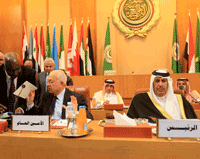
Arab League proposes new Syria transition plan
Cairo, January 23, 2012
Arab League foreign ministers proposed on Sunday that Syria's embattled President Bashar al-Assad hand over power to a deputy and set up a new unity government, after their earlier peace plan failed to end 10 months of bloodshed.
They said the League would ask the UN Security Council to endorse its new plan. It appeared highly unlikely that Assad, who has mocked the League and pledged in a recent speech to intensify a crackdown on "terrorists" and "conspirators", would agree to it.
The Arab League proposal envisages the creation of a unity government as a prelude to early parliamentary and presidential elections, Qatari Prime Minister Sheikh Hamad bin Jassim al-Thani said after a day of Arab meetings on the Syrian crisis.
He compared the proposal to a Gulf plan on Yemen, which saw President Ali Abdullah Saleh agree to hand over power.
It was not clear, however, how the League might enforce its latest plan, given the failure of an Arab observer team in Syria to end the Assad governmen's repression of an uprising in which the United Nations says 5,000 people have died.
"We ask that the Syrian regime leave and hand over power," Sheikh Hamad said. "We are with the Syrian people, with their will and with their aspirations."
Deep splits among the 22 member states have complicated the Arab League's efforts to take a strong stand on the Syrian crisis, but Sunday's proposal was approved by all save Lebanon, a smaller neighbour which has consistently opposed escalation. Algeria objected to taking the plan to the Security Council.
The main opposition Syrian National Council, which has urged the Arab League for weeks to refer the Syrian crisis to the UN Security Council, welcomed the initiative.
"This confirms that all Arab countries today consider the tyrannical regime of Bashar al-Assad to be finished and that it must be replaced," SNC chief Burhan Ghalioun told a news conference in Cairo, where the foreign ministers met.
The Security Council is also split on how to address the crisis, with Western powers demanding tougher sanctions and a weapons embargo, and Assad's ally Russia preferring to leave the Arabs to negotiate a peaceful outcome.
Asked about a previous Arab threat to impose sanctions on Assad, Sheikh Hamad said: "Arab economic sanctions will be imposed via the Security Council." He did not elaborate.-Reuters







